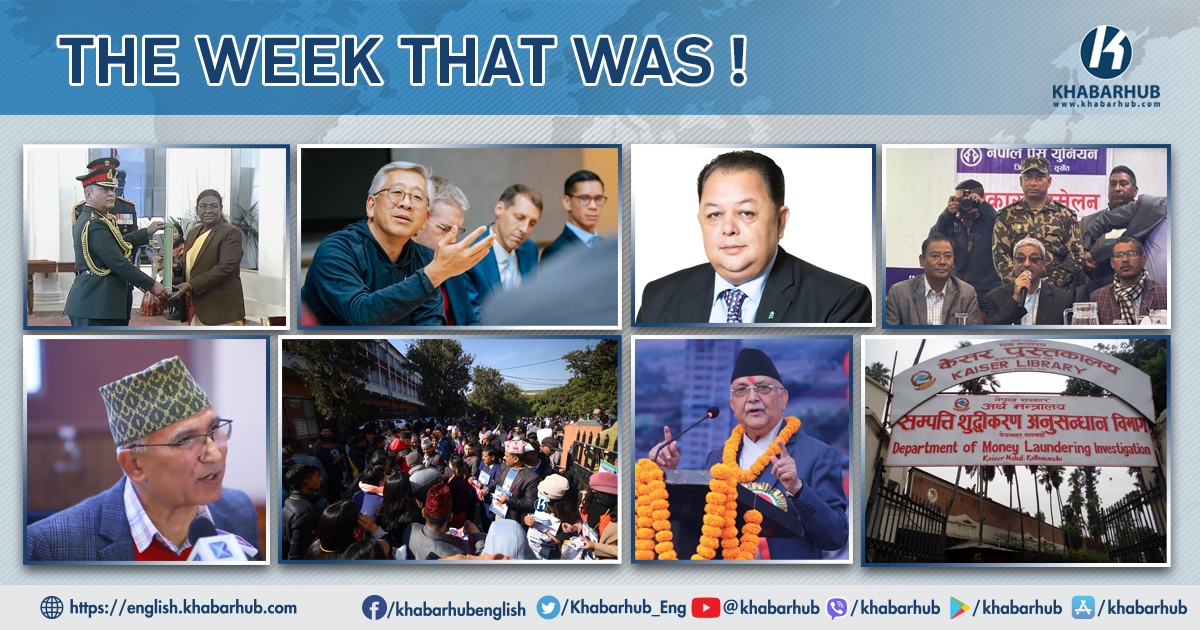KATHMANDU: The past week in Nepal has been marked by notable diplomatic engagements, domestic controversies, and significant political developments, painting a complex picture of the country’s evolving geopolitical and socio-political landscape.
The past week in Nepal underscores the nation’s complex position on both the domestic and international fronts.
On one hand, there is significant progress in strengthening foreign ties and promoting development; on the other, deep-seated domestic issues—be it in governance, economic management, or legal fairness—continue to challenge the country’s aspirations for a more stable and prosperous future.
As Nepal navigates these contradictions, its ability to balance domestic demands with international expectations will be crucial in shaping the trajectory of the nation in the years to come.
Strengthening Nepal-US Relations
The arrival of US Assistant Secretary of State Donald Lu in Kathmandu was one of the most closely watched events of the week.
His three-day visit underscored the growing diplomatic and developmental ties between Nepal and the United States.
Lu’s meetings with Nepali leaders, civil society, and youth groups signaled a strategic intent to reinforce cooperation in crucial sectors such as environmental protection, women’s empowerment, and sustainable development.
His call for Nepal to have good relations with all its neighbors, while prioritizing its own sovereignty, echoes the delicate balance Nepal seeks to maintain in its foreign policy amidst the growing influence of global powers.
The timing of this visit, following Prime Minister KP Sharma Oli’s visit to China and the signing of the Belt and Road Initiative (BRI) framework, provides a telling reminder of the balancing act Nepal faces.
With many accidents occurring on Nepal’s dangerous and poorly maintained highways, the incident has reignited calls for improved infrastructure and better enforcement of traffic laws.
Lu’s statement that the US would withhold comment on the BRI agreement until the official document is released suggests a measured approach as the US assesses the potential long-term implications of Nepal’s participation in China’s ambitious global infrastructure project.
For Nepal, navigating its relationships with both China and the US will remain a key challenge in the years ahead.
Rabi Lamichhane’s legal battle
Meanwhile, domestic politics were dominated by the legal woes of Rabi Lamichhane, Chairman of the Rastriya Swatantra Party (RSP), whose detention has sparked political and public outrage.
The week saw divergent views from the political spectrum on Lamichhane’s treatment, with prominent figures like Pushpa Kamal Dahal (Prachanda) condemning what he termed the “vindictive” actions of the government, while Home Minister Ramesh Lekhak defended the law enforcement process.
The growing polarization over Lamichhane’s detention reflects broader concerns about due process and political influence over judicial proceedings.
For Lamichhane and his supporters, this saga has become a rallying point for claims of political victimization.
However, the government’s position remains firm, emphasizing that the investigation is fair and transparent.
As his detention was extended for another five days, the case has become a flashpoint in the ongoing debate about justice, political freedom, and governmental accountability.
Economic troubles and leadership shifts
On the economic front, Finance Minister Bishnu Prasad Paudel faced increased pressure over his handling of Nepal’s economic challenges.
Despite taking office with promises of economic revival and job creation, his tenure has been marked by sluggish progress.
Criticism is mounting, not just from opposition parties, but even from within his own party, raising questions about the effectiveness of his leadership.
Paudel’s struggle to stimulate growth amid rising unemployment and inflation mirrors the broader economic stagnation in Nepal, making it a critical issue for the government as it looks to secure stability in the face of mounting domestic discontent.
Adding to the economic uncertainty, the appointment of Gorakh Rana as the first Nepali CEO of Standard Chartered Bank Nepal represents a symbolic shift in leadership but also highlights the broader issue of economic reforms and capacity building in Nepal’s financial sector.
The appointment may be seen as a positive move for the private sector, but it also underscores the pressing need for leadership across all sectors to tackle Nepal’s economic malaise.
Infrastructure and development
On the development front, Prime Minister KP Oli’s inauguration of the Damak Business Complex in Jhapa was touted as a model of modern development.
The 18-story building, part of a larger vision to turn Damak into a modern city, is an example of Nepal’s growing urban development ambitions.
However, there is also skepticism about whether such high-profile projects can translate into meaningful economic growth or merely represent symbolic steps without addressing deeper structural issues, such as access to basic services and infrastructure in rural areas.
In a similar vein, the formation of a seven-member task force to combat money laundering reflects a growing focus on improving governance and financial transparency.
Yet, while such initiatives are commendable, their success will ultimately depend on the effective implementation of reforms and the political will to tackle entrenched corruption.
Tragedy strikes in Rautahat
On a more somber note, the tragic jeep accident in Rautahat, which claimed the lives of eight people, serves as a stark reminder of Nepal’s ongoing challenges with road safety.
With many accidents occurring on Nepal’s dangerous and poorly maintained highways, the incident has reignited calls for improved infrastructure and better enforcement of traffic laws.
CoAS Sigdel receives honorary rank from Indian Army
Nepal’s Chief of Army Staff (CoAS), General Ashok Raj Sigdel, was awarded the honorary rank of General in the Indian Army last week.
The prestigious honor was conferred upon General Sigdel by Indian President Draupadi Murmu during a special ceremony at Rashtrapati Bhavan in New Delhi.
The event took place on Thursday and was attended by Indian Army Chief General Upendra Dwivedi, along with senior military and security officials. Representatives from the Nepali Embassy were also present.
During the ceremony, General Sigdel was addressed as ‘Suprabal Janasewashree Maharathi.’









Comment